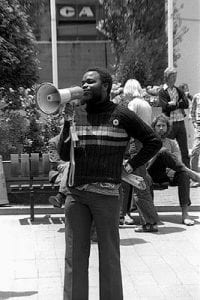International Human Rights Day 2017
Supporting democracy and human rights is one of the six principles of the Universal Declaration on Archives was adopted by the 36th Session of the General Conference of UNESCO on 10th November 2011. In acknowledging International Human Rights Day on the 10th of December each year, archives and their Galleries, Libraries, Museums (GLAM) colleagues have a professional obligation to reflect on their role as custodians of records document human rights violations.

Cultural institutions, both government and non-government, hold a diversity of records from the professional and personal papers of government departments, politicians, administrators, ‘care’ institutions, professional organisations, church and political groups, humanitarian organisations, and individual activists. As such, archival records can be vital to truth telling, validation of lived experience, sites of redress, and facilitation of justice for survivors, victims and their advocates.
Several sessions at the recent Australian Society of Archivists (ASA)conference and Information Technologies Indigenous Communities (ITIC) symposium touched on the experiences of archivists working with records relating to human rights, and highlighted the efforts of many groups in the sector opening up collections to further support human rights.
With the intention of continuing this conversation, and to acknowledge International Human Rights Day in 2017, UMA staff have compiled a list of resources which delve into the many aspects of archives and human rights. We welcome your suggestions to further this list by sharing your reading lists with us in the comments.
- McKemmish, S, Iacovino, L, Ketelaar, E, Castan, M, & Russell, L 2011, ‘Resetting Relationships: Archives and Indigenous Human Rights in Australia’, Archives and Manuscripts, no. 1, p. 107.
- Iacovino, L 2010, ‘Rethinking Archival, Ethical and Legal Frameworks for Records of Indigenous Australian Communities: A Participant Relationship Model of Rights and Responsibilities,’ Archival Science vol. 10, no. 4, pp. 353–72.
- Australian Human Rights Commission, ‘UN Declaration on the Rights of Indigenous Peoples’, https://www.youtube.com/watch?v=bB2uZxekt-k&feature=youtu.be
- Luker, T 2017, ‘Decolonising Archives: Indigenous Challenges to Record Keeping in Reconciling’ Settler Colonial States’, Australian Feminist Studies, vol. 32, no. 91-92, pp. 108-125
- Thomas, David & Fowler, Simon, (author.) & Johnson, Valerie, (author.) 2017, The silence of the archive, London Facet Publishing
- Carter, R 2006, ‘Of Things Said and Unsaid: Power, Archival Silences, and Power in Silence’, Archivaria, no. 61, p. 215.
- Caswell, M 2014, ‘Toward a survivor-centered approach to records documenting human rights abuse: lessons from community archives’, Archival Science, vol. 14, no. 3/4, pp. 307-322.
- Robinson, G 2014, ‘Break the rules, save the records: human rights archives and the search for justice in East Timor’, Archival Science, vol. 14, no. 3/4, pp. 323-343.
- Strauss, A 2015, ‘Treading the ground of contested memory: archivists and the human rights movement in Chile”, Archival Science: International Journal on Recorded Information, no. 4, p. 369.
- Society of American Archivists Human Rights Archives Section, blog, https://hrarchives.wordpress.com/
- Caswell, M 2017, ‘Teaching to Dismantle White Supremacy in Archives’, The Library Quarterly 87, no. 3, pp. 222-235.
- Harris, V 2017, ‘Passion for Archive’, ASA ITIC conference keynote, https://youtu.be/w7wUExeVNfw
- Caswell, M, Cifor, M 2016, ‘From Human Rights to Feminist Ethics: Radical Empathy in Archives’, Archivaria no. 81 (Spring pp. 23-43.
- Ghaddar, J.J. 2016, ‘The Spectre in the Archive: Truth, Reconciliation, and Indigenous Archival Memory’, Archivaria, [S.l.], pp. 3-26
Categories
Leave a Reply